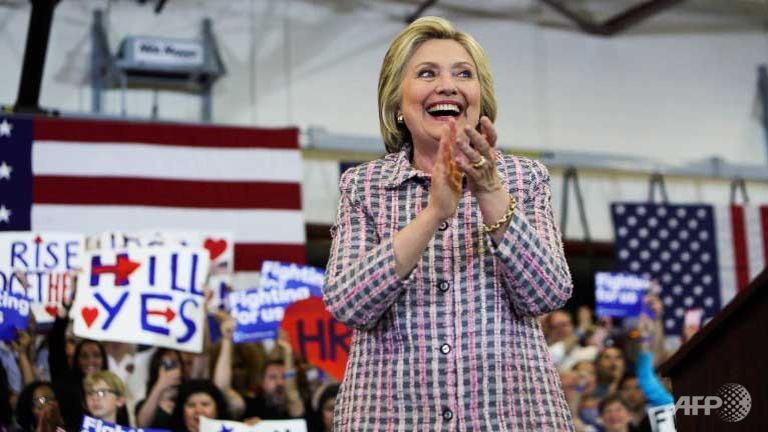Obama poised to endorse Clinton as Democratic presidential nominee
 |
| Democratic presidential candidate Hillary Clinton addresses supporters during a campaign rally at Sacramento City College in Sacramento, California, USA. (GABRIELLE LURIE/AFP) |
WASHINGTON: President Barack Obama edged closer to a formal endorsement of Hillary Clinton as the Democratic presidential nominee on Monday (Jun 6), suggesting the next 48 hours would be pivotal.
With a series of primary votes on Tuesday that could see Clinton all but seal the party nomination, the White House refused to rule out an endorsement within days.
"Once the voters in New Jersey and California have an opportunity to express their preference," said White House spokesman Josh Earnest, "then we may be in a position where we have a much greater sense of what the outcome is likely to be."
It is an open secret in Washington that President Barack Obama intends to endorse Clinton. But Obama has been wary of putting his hand on the scale during a long and sometimes bitter Democratic primary race between Clinton and leftist party rival Bernie Sanders.
He wants to avoid alienating millions of young voters who have flocked to Sanders's energetic campaign.
The 74-year-old senator from Vermont - who was an independent until recently - has given voice to popular anger about income inequality.
"I think the Sanders campaign would agree that the president has worked hard and gone to great lengths to be fair," said Earnest.
But, he added: "The president does have a long, personal relationship with Secretary Clinton. She served as secretary state for more than four years, for goodness sake."
Sanders has won 10 million votes during the primaries, three million fewer than Clinton.
But Sanders's supporters have vowed to fight to the bitter end and even challenge Clinton's nomination at the Democratic convention in Philadelphia in July.
Yet there is growing unease in Democratic circles that such infighting could open a window for Republican presumptive nominee Donald Trump.
"The Democratic Party cannot afford to take lightly the risk that is posed by the potential of electing the presumptive Republican nominee," said Earnest.
Such comments send an unmistakable message to the Sanders camp.
So too do the words of Clinton, as she campaigned in California.
"I'm gonna do everything I can to unify the Democratic party, and I certainly am going to be reaching out to Senator Sanders and hope he will join me in that," she said.
PRESIDENTIAL POLLS
Obama's recent high poll ratings all but secure him a central role in the effort to secure a third White House term for Democrats.
According to Gallup, his approval is now 51 per cent, almost double George W. Bush's approval at the same point in his presidency.
Obama aides have long said they would defer to Clinton's campaign about his role in her campaign. But a few patterns have already emerged.
Obama has scarcely concealed his contempt for Trump and has repeatedly belittled him during speeches, although not always by name.
The 44th president has also made the economy a theme of campaign-style events. That is an issue that is sure to be central across the rust belt and beyond.
Polls show Obama remains hugely popular among college educated women, who could prove vital in states like Pennsylvania and Virginia.
Unsurprisingly for the country's first minority president, he is also popular among black, Hispanic and Asian voters.
Obama may spend a significant amount of time stumping for Senators in a bid to flip the chamber to Democratic control.
Republican donors who are disgruntled with Trump have vowed to pour their cash into Congressional races, hoping to limit the fallout from Trump's unpopularity.
Obama also remains stratospherically popular with liberal democrats - a 92 per cent approval rating with the group according to Gallup - which puts him a good position to win over disgruntled Sanders voters.
What the stars mean:
★ Poor ★ ★ Promising ★★★ Good ★★★★ Very good ★★★★★ Exceptional
Latest News
More News
- ASEAN states unite for future economic stability (March 06, 2025 | 10:41)
- Indonesia plans over 20 energy projects in 2025 (March 05, 2025 | 10:09)
- Bali to use “water taxi” to address traffic congestion (March 04, 2025 | 17:15)
- RoK, Thailand hold 4th round of economic partnership negotiations (March 04, 2025 | 16:48)
- Thailand busts illegal e-money firms (March 03, 2025 | 16:47)
- Thailand to repatriate thousands of scam centre workers from Myanmar (March 03, 2025 | 10:51)
- PM stresses need for ASEAN to embrace new technologies (February 26, 2025 | 17:30)
- The world's future belongs to the youth: PM (February 26, 2025 | 17:23)
- More than 200 foreigners rescued from Cambodian scam centre (February 25, 2025 | 16:06)
- New Zealand PM’s visit to tighten bonds with Vietnam: Ambassador (February 24, 2025 | 11:22)



















 Mobile Version
Mobile Version